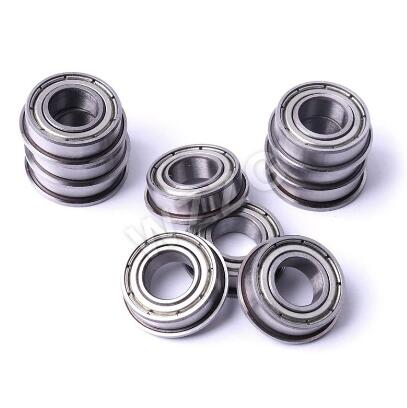Miniature Bearings: Small Parts, Big Impact
In the realm of engineering and machinery, size doesn't always equate to significance. Miniature bearings, though small in stature, play a pivotal role in a wide range of applications, from precision instruments to consumer electronics and robotics. In this article, we'll delve into the world of miniature bearings, exploring their design, applications, and the crucial role they play in modern technology.
Understanding Miniature Bearings:
Miniature bearings, also known as mini bearings or micro bearings, are compact and precisely engineered components designed to reduce friction and support rotational or linear movement in confined spaces. Despite their diminutive size, these bearings are built to meet high-performance standards and offer exceptional reliability.
Design and Construction:
Miniature bearings are available in various designs and configurations to suit specific application requirements. Here are some key components of their design:
Inner and Outer Rings: Similar to standard bearings, miniature bearings consist of inner and outer rings. The inner ring typically attaches to the rotating component, while the outer ring is mounted within the housing or surrounding structure.
Balls or Rollers: high speed Miniature bearings incorporate either balls or rollers as rolling elements. Balls are more common in these smaller bearings due to their suitability for high-speed applications.
Cage: To maintain proper spacing and alignment of the balls, a cage is often employed. The cage helps distribute the load evenly among the balls, reducing friction and preventing contact between them.

Applications of Miniature Bearings:
Precision Instruments: Miniature bearings are vital components in precision instruments such as watches, clocks, and gauges. They enable the smooth and accurate movement of hands, gears, and other components, ensuring precise timekeeping and measurements.
Consumer Electronics: In consumer electronics like smartphones, cameras, and DVD players, miniature bearings facilitate the smooth operation of buttons, sliders, and zoom lenses. Their low friction design ensures a responsive user experience.
Medical Devices: Medical equipment, including dental handpieces, infusion pumps, and surgical instruments, relies on miniature bearings for precision and reliability. These bearings enable the precise control of rotating or linear movement in critical medical procedures.
Robotics and Automation: Miniature bearings are essential in robotics and automation systems. They support the movement of robot joints, conveyor belts, and linear slides, contributing to the precision and efficiency of these systems.
Aerospace and Aviation: The aerospace industry employs miniature bearings in various aircraft components, from cockpit controls to landing gear systems. Their ability to withstand high speeds and extreme conditions is vital for safety and performance.
3D Printing: Miniature bearings are used in 3D printers to ensure smooth and precise movement of print heads and build platforms. These bearings contribute to the accuracy of printed objects.
Significance and Advantages:
Space Efficiency: Miniature bearings are designed for compact spaces, making them ideal for applications where size constraints are a concern.
Reduced Friction: These bearings offer low friction and excellent wear resistance, resulting in longer service life and improved efficiency.
High-Speed Capability: Miniature bearings are engineered to handle high rotational speeds, making them suitable for applications where rapid movement is required.
Precision and Accuracy: Their precise design allows for accurate control of movement, making them indispensable in applications demanding exacting standards.
Conclusion:
Miniature bearings may be small, but their impact on modern technology and machinery is substantial. From keeping time in precision instruments to ensuring the smooth operation of consumer electronics and contributing to the precision of robotics, these tiny components are indispensable. Their efficient design, low friction, and high-speed capabilities make them essential in countless applications where size and precision matter. As technology continues to advance, the importance of miniature ball bearings in shaping our increasingly compact and precise world cannot be overstated.

Comments
0